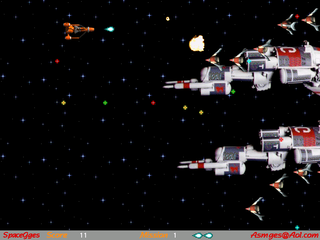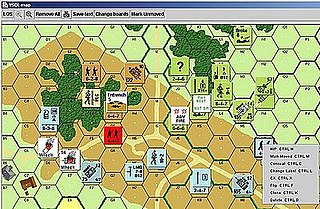A massively multiplayer online role-playing game (MMORPG) is a video game that combines aspects of a role-playing video game and a massively multiplayer online game.

A player character is a fictional character in a video game or tabletop role-playing game whose actions are controlled by a player rather than the rules of the game. The characters that are not controlled by a player are called non-player characters (NPCs). The actions of non-player characters are typically handled by the game itself in video games, or according to rules followed by a gamemaster refereeing tabletop role-playing games. The player character functions as a fictional, alternate body for the player controlling the character.

A video game genre is an informal classification of a video game based on how it is played rather than visual or narrative elements. This is independent of setting, unlike works of fiction that are expressed through other media, such as films or books. For example, a shooter game is still a shooter game, regardless of where or when it takes place. A specific game's genre is open to subjective interpretation. An individual game may belong to several genres at once.
A massively multiplayer online game is an online video game with a large number of players, often hundreds or thousands, on the same server. MMOs usually feature a huge, persistent open world, although there are games that differ. These games can be found for most network-capable platforms, including the personal computer, video game console, or smartphones and other mobile devices.

A train simulator is a computer based simulation of rail transport operations. They are generally large complicated software packages modeling a 3D virtual reality world implemented both as commercial trainers, and consumer computer game software with 'play modes' which lets the user interact by stepping inside the virtual world. Because of the near view modeling, often at speed, train simulator software is generally far more complicated and difficult software to write and implement than flight simulator programs.
Micromanagement in gaming is the handling of detailed gameplay elements by the player. It appears in a wide range of games and genres, including strategy video games, construction and management simulations, and pet-raising simulations. Micromanagement has been perceived in different ways by game designers and players for many years: some perceive it as a useful addition to games that adds options and technique to the gameplay, something that is necessary if the game is to support top-level competitions; some enjoy opportunities to use tactical skill in strategic games; others regard it as an unwelcome distraction from higher levels of strategic thinking and dislike having to do a lot of detailed work. Some developers attempt to minimize micromanagement in a game's interface for this reason.
Tactical role-playing games, also known as strategy role-playing games and in Japan as simulation RPGs, are a video game genre that combines core elements of role-playing video games with those of tactical strategy video games. The formats of tactical RPGs are much like traditional tabletop role-playing games and strategy games in appearance, pacing, and rule structure. Likewise, early tabletop role-playing games are descended from skirmish wargames such as Chainmail, which were primarily concerned with combat.
The following outline is provided as an overview of and topical guide to video games:

Business simulation games, also known as economic simulation games or tycoon games, are games that focus on the management of economic processes, usually in the form of a business. Pure business simulations have been described as construction and management simulations without a construction element, and can thus be called management simulations. Indeed, micromanagement is often emphasized in these kinds of games. They are essentially numeric, but try to hold the player's attention by using creative graphics. The interest in these games lies in accurate simulation of real-world events using algorithms, as well as the close tying of players' actions to expected or plausible consequences and outcomes. An important facet of economic simulations is the emergence of artificial systems, gameplay and structures.

Zoo Tycoon is a series of business simulation video games. The worlds focus around building and running successful zoo scenarios. The series was initially developed by Blue Fang Games and published by Microsoft Studios who later in 2001–2008 went on to create two stand-alone video games and seven expansion packs for PC and Macintosh platforms. In 2013, Microsoft Studios released a new Zoo Tycoon game, developed by Frontier Developments for Xbox One and Xbox 360. An enhanced version of the Xbox game, Zoo Tycoon: Ultimate Animal Collection, was released for Windows 10 and the Xbox One on October 31, 2017. Frontier Developments, the developer of the final Zoo Tycoon game, released the spiritual successor to the series, Planet Zoo, in 2019.
Construction and management simulation (CMS), sometimes also called management sim or building sim, is a subgenre of simulation game in which players build, expand or manage fictional communities or projects with limited resources. Strategy video games sometimes incorporate CMS aspects into their game economy, as players must manage resources while expanding their project. Pure CMS games differ from strategy games, however, in that "the player's goal is not to defeat an enemy, but to build something within the context of an ongoing process." Games in this category are sometimes also called "management games".

A computer wargame is a wargame played on a digital device. Descended from board wargaming, it simulates military conflict at the tactical, operational or strategic level. Computer wargames are both sold commercially for recreational use and, in some cases, used for military purposes.
In video games, first person is any graphical perspective rendered from the viewpoint of the player's character, or a viewpoint from the cockpit or front seat of a vehicle driven by the character. The most popular type of first-person video game today is the first-person shooter (FPS), in which the graphical perspective is an integral component of the gameplay. Many other genres incorporate first-person perspectives, including other types of shooter games, adventure games, amateur flight simulations, racing games, role-playing video games, and vehicle simulations.
Strategy is a major video game genre that emphasizes thinking and planning over direct instant action in order to achieve victory. Although many types of video games can contain strategic elements, as a genre, strategy games are most commonly defined as those with a primary focus on high-level strategy, logistics and resource management. They are also usually divided into two main sub-categories: turn-based and real-time, but there are also many strategy cross/sub-genres that feature additional elements such as tactics, diplomacy, economics and exploration.
The browser-based IndustryMasters product is a range of business simulation games that allows students, business people and others to sharpen their entrepreneurial and strategic management skills by building their own company and competing in real-time against each other
Anno is a real-time strategy, economic simulation video game series, conceived in 1998 by Max Design. The series focuses on players establishing colonies on a series of small islands, conducting exploration of the region, diplomacy and trade with other civilisations and traders, while managing resources and engaging in combat both on land and sea. Most games in the series take place during Renaissance and Empire-building historical periods of Earth's history, with cultures, architecture and customs based upon real-life elements from these periods, though in-game civilisations tend to be neutral from exact nations.
Time management games are a subgenre of strategy and casual video games focused on fast real-time allocation of resources in a consequent order to fulfill specific game objectives. Games of this type often overlap with tycoon games and other business simulation games, where the player is required to manage a business by acquiring resources and deciding how to use them in a timely fashion. The player often must react to incoming requests that occur as they play and serve them in the most effective manner to get the greatest possible reward. Objectives and reward scenarios are usually time-limited, and the availability of resources limits the speed at which the player can serve the requests. Tapper and Diner Dash are popular games in the genre.
Mushroom Wars 2 is a real-time strategy video game, developed and published by Zillion Whales. It is the sequel to Mushroom Wars, and was released on iOS, tvOS, Android and Microsoft Windows via Steam on October 13, 2016 and on Nintendo Switch on July 5, 2018. Versions for PlayStation 4, and Xbox One are expected to follow soon.






